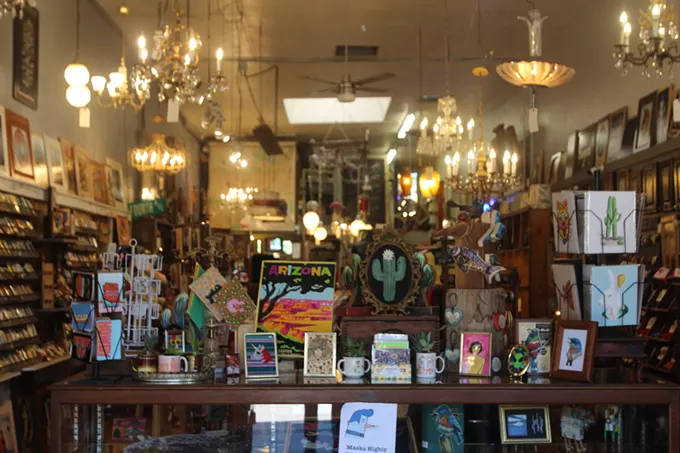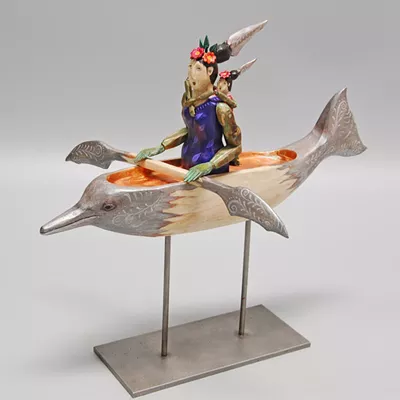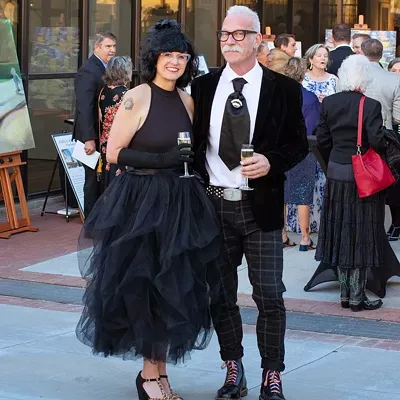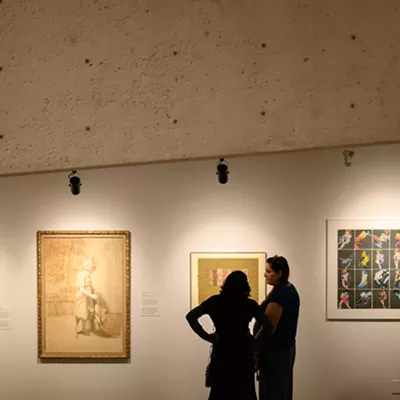
After nearly two years, vendors and patrons filled the colorful streets of Fourth Avenue for the Winter Street Fair in December 2021. Following that successful winter fair, the larger Spring Street Fair returned just last month to an even larger turnout. The events, which annually draw hundreds of thousands of attendees, were delayed multiple times due to the pandemic, bringing fewer patrons to the already-impacted local businesses lining Fourth Avenue. With the return of these large events, plus an increase in daily traffic, the avenue is looking bright — albeit with some remaining roadbumps and potholes.
Fourth Avenue might have the strongest ratio of personality-to-square-feet in all of Tucson. North of the Fourth Avenue underpass, the corridor contains multiple coffeeshops, record stores, boutiques, art stores and bars. Geographically and culturally, it is the intersection of the university district and downtown. However, that culture has suffered multiple losses over the past few years, including the closure of the Flycatcher bar to be replaced by an apartment building. The pandemic certainly didn’t help, with multiple small businesses closing. But for some, including the eclectic art store Pop Cycle, things are well on the road to recovery.
“This last year has been our best year ever. It’s kind of crazy, and we’re blown away by how lucky we were. There’s been so much support, not just from the Tucson community, but also from visitors from out of town,” said Shannon Riggs, co-owner of Pop Cycle and chair of the Historic Fourth Avenue Coalition. “The avenue’s busy. I know the retail is doing well, and of course the bars and restaurants struggled a lot more, but when I look around the avenue, it always looks pretty hopping these days.”
Pop Cycle, which sells a variety of recycled and local art, closed for six months in 2020. Not only did this impact the staff, but also the local artists whose work is sold in the store. Though Riggs admits the pandemic was very difficult for the avenue, she says it could have been worse.
“We’re super lucky to not have lost many businesses,” Riggs said. “We did lose a few, but all the people that I know of who were running those businesses have bounced back and are doing something else. That’s really rad.”
But now with restrictions lifted and business back up, there was also an opportunity to bring back the Made In Tucson Market in addition to the Street Fair. On a smaller scale, the Made In Tucson Market is exclusively for vendors from the area. With 165 vendors and thousands of attendees, this April saw the largest ever Made In Tucson Market.
“Something we hear from people is that the Street Fair should have more local vendors. Of course there are local artists who do Street Fair, but we wanted to do an event that was exclusively local,” Riggs said. “And I think it just has a funkier, grassroots vibe. All of the signs were handpainted, and I feel like that matches the funky vibe of Fourth Ave that is important.”
While many stores are doing better, that’s not to say others haven’t been forever changed by the pandemic. Just down the avenue, Antigone Books is another beloved shop that survived. However, co-owner Kate Stern says they are a smaller operation and that pre-pandemic time was almost like operating a different business.
“I wouldn’t say that we’re back to where we were, even without the inflation. It’s hard to gauge,” Stern said. “It was actually kind of slow here for the Street Fair. Traditionally, it’s always a lot of people browsing, and not everyone is shopping. But overall, it’s good for us. Our sales are not amazing. Usually, the winter fair is bigger for us. We didn’t notice a huge uptick in sales, but it’s always good for the avenue as a whole. The Fourth Avenue Merchants Association relies on that revenue, and we rely on them. So it’s systemic in that way.”
Stern says there are a number of difficulties in the world we now find ourselves in. Beyond record inflation, there are also lingering staffing issues and the pervasive supply chain problems. As a result, Antigone has been forced to raise prices on their gift items like calendars, while list prices of books have also increased.
Because of supply chain backups, some of the bookstore’s orders have either not shown up, or showed up months later. Stern says it’s been difficult to keep their displays stocked, and people have even asked if they’re going out of business because their shelves might be empty, even if an order had been placed months prior. This has also impacted special book orders, as it’s difficult to give customers an estimated time of arrival.
“People have been pretty upset at times, not understanding we have no control over it,” Stern said. “People have learned to be more flexible over the past year, but not everyone is quite used to it.”
Over the pandemic, the rate of shipping a 40-foot container across the Pacific has surged more than 500%, breaking $20,000, a record price. This type of increase has even impacted stores like Pop Cycle, which use many recycled materials for their products.
“Almost across the board, our artists have had to raise their prices,” Riggs said. “Even though it’s recycled and handcrafted, there’s always something you have to buy. And we make a lot of the things ourselves in our studio in the back, and the magnets we use, the price and shipping has doubled. So we’ve had to raise prices on things that we’ve never raised prices on ever.”
Riggs says that she doesn’t know of people who can’t get what they need, it’s just that there are delays and price increases on everything, and that can be difficult for artist deadlines.
Despite all this, merchants like Riggs and Stern say they feel that Fourth Avenue business owners are hopeful. Antigone plans to bring back their own community events later this year.
“It’s been a really rough couple of years for everyone, and it’s definitely better now. But we’re all still dealing with the
repercussions of the pandemic,” Stern said. “Even though a lot of people in the world have moved on and are ready to be done with it, I think there are longer term effects from it. But we’re all in it together and it’s been refreshing to see that other businesses are in the same place as us. And I think the general attitude of the merchants is support. It’s made people closer, more understanding and neighborly.”
The pandemic hasn’t stopped some Fourth Avenue stores from even expanding. On Thursday, May 5, the Food Conspiracy Co-op broke ground on an additional entrance on the back of their store. The finished expansion will add an entrance on their store’s east side, 2,000 square feet of retail space, 33 parking spaces and solar panels. Andrea Buttrick, communications coordinator for Food Conspiracy Co-op, says the expansion has been planned since before the pandemic.
“Our sales are now growing exponentially, and shoppers are showing back up,” Buttrick said. “There’s a feeling of excitement and interest to be back out. Of course, there is still some hesitancy, but people are excited.”
Buttrick says the Food Conspiracy Co-op was in a unique position to weather the pandemic as compared to other grocery stores, because they get much of their produce from local farmers. As a result, they were able to stay open through the pandemic. However, she confirms they are suffering from inflation like everyone else.
“It really shows the caliber of our staff that they showed up and continued working,” Buttrick said.
In total, the Winter Street Fair had approximately 300,000 attendees. The Fourth Avenue Merchants Association says they made little revenue on the first one back as the event was primarily “to make good from all the cancellations due to COVID.” However, the following Spring Street Fair saw an estimated 600,000 attendees, and vendors reported it being one of the best ever. Because the fair was shuttered for three instances, the Fourth Avenue Merchants Association estimates it will take one more fair to get “back on its feet.”
“We just want to remind people that Fourth Ave. has been this hub of localism and community fun for all these years, and we’d love to do more cool stuff,” Riggs said. “With the money we’re making from events, I think that is going a long way to helping us put on more. We just want people to come down to the avenue and remember what they like about it.”







